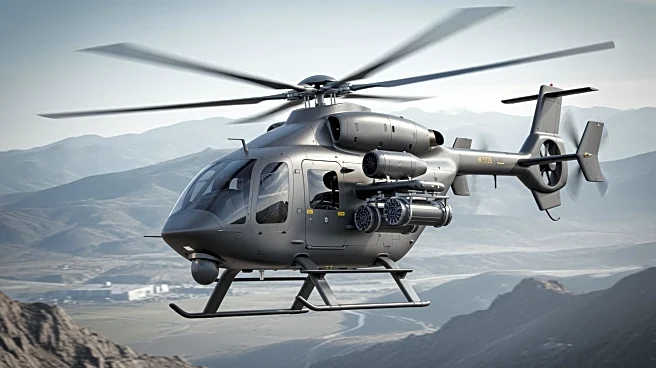What's Happening?
Sikorsky, a subsidiary of Lockheed Martin, has unveiled a new variant of the UH-60 Black Hawk helicopter, known as the U-Hawk. This autonomous version is designed to operate without a physical pilot or crew,
offering significant advancements in military logistics. The U-Hawk, temporarily designated as S-70UAS, boasts 25% more cargo space than its predecessor due to the absence of a crewed cockpit. It can be controlled by a single soldier using a tablet, allowing for remote operation in hostile environments. The prototype is set to take its first flight in 2026, with potential integration into the U.S. military's inventory shortly thereafter.
Why It's Important?
The introduction of the U-Hawk represents a significant shift towards automation in military operations, reflecting the growing trend of utilizing drones and autonomous systems in modern warfare. By eliminating the need for onboard personnel, the U-Hawk reduces risk and increases operational efficiency, allowing for greater cargo capacity and flexibility in mission planning. This development could enhance the U.S. military's logistical capabilities, enabling rapid deployment and resupply in combat zones. The U-Hawk's compatibility with existing UH-60 systems ensures ease of maintenance and integration, potentially leading to widespread adoption across military branches.
What's Next?
The U-Hawk's first flight in 2026 will be a critical milestone, determining its viability for military use. If successful, the U-Hawk could be rapidly integrated into the U.S. military's operations, providing a new tool for logistics and combat support. Stakeholders, including military leaders and defense contractors, will likely monitor the U-Hawk's performance closely, assessing its impact on future military strategies. The development of autonomous systems like the U-Hawk may also prompt discussions on ethical considerations and the role of human oversight in military operations.
Beyond the Headlines
The U-Hawk's introduction raises questions about the future of military aviation and the balance between human and machine roles in warfare. As autonomous systems become more prevalent, there may be increased scrutiny on the ethical implications of unmanned operations, particularly in combat scenarios. Additionally, the U-Hawk's capabilities could influence global military strategies, prompting other nations to accelerate their own autonomous technology development to remain competitive.









